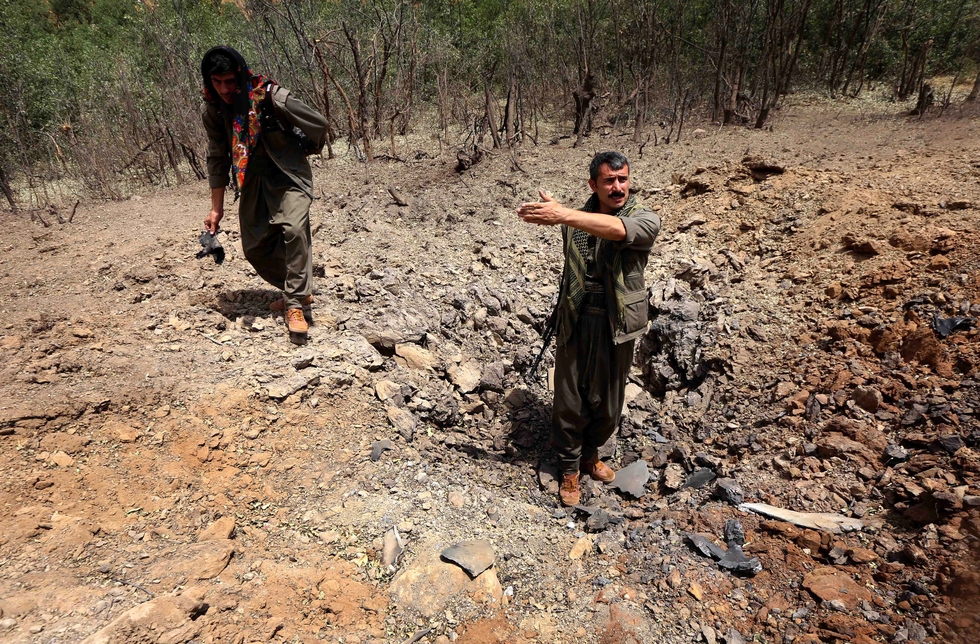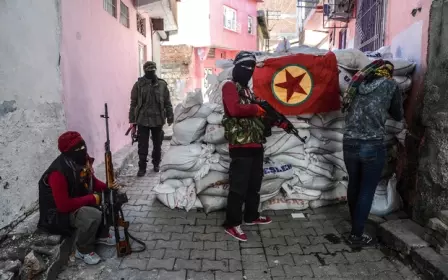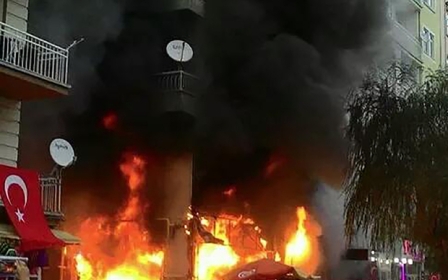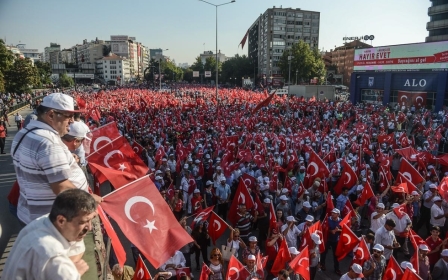Ankara bombing: PKK, TAK ties come under scrutiny again

The car bomb attack in Ankara last month which left 29 people dead was claimed by Freedom Falcons of Kurdistan (TAK).
The Turkish authorities had stated earlier that the Syrian Kurdish group the People's Protection Units (YPG), a sister organisation of the Kurdistan Workers' Party (PKK), which has been waging war against the Turkish state for 30-plus years, was responsible. The TAK-claim didn't change the authorities' mind: to them, these groups are all connected to each other and are basically the same. But how connected is TAK really to the PKK?
Zagros Hiwa, a spokesperson of the PKK who resides in the Qandil mountains in the north of Iraq, where the PKK leadership hides out, told me via email: "I would like to say that neither me nor the leaders or cadres are in the position to speak about TAK because we don't have information about them." Hiwa added: "'The only thing I can say is that somebody somewhere has decided to speak with [Turkish President] Erdogan in the only language he understands."
Hiwa was echoing a statement that the PKK militants' co-leader in Qandil, Cemil Bayik, made a day after the bombing, in which he said that he didn't know who carried out the attack but that it "could be a retaliation for massacres carried out in Kurdistan".
Bayik's statement was in reference to the high cost of civilian lives in the operations carried out by the Turkish army in the Kurdish-majority southeastern regions of Turkey, which human rights groups say are the result of the security forces' "abusive and disproportionate use of force". Bayik also said: "The ones carrying out the attack would probably declare the reasons soon," which happened the next day on the TAK's website.
The origins of the TAK are debated, but it is assumed the group was formed by the PKK itself more than 10 years ago to carry out attacks in cities in the west of Turkey. Soon, however, the group started to follow its own course, choosing a more radical line than the PKK. Where the PKK generally attacks targets in which civilian deaths are not very likely but do occur, the TAK acts contrary to that: they hit places where civilian deaths are inevitable.
The Ankara bombing is an example of that: of the 29 victims, 16 were civilians, most of them working at army compounds. In the previous attack claimed by TAK, at Istanbul's second airport, Sabiha Gokcen, in late December last year, one cleaning lady lost her life. Another example is an attack in Istanbul's Taksim Square in 2010, in which 32 people were wounded, 15 of them policemen and the rest civilians.
Journalists like Aliza Marcus, who wrote a book on the history of the PKK, expressed scepticism about the PKK's claim that its didn't know who carried out the attack and that it could not comment since it had no information about TAK.
"It would be the first time in the history of the PKK that they allow the existence of any other group representing the Kurds than themselves. In the 1990s, the PKK fought with rival Kurdish groups in Europe, it has killed dissidents within its own ranks. I see no reason why they would allow another group on the stage now," she told me via Skype.
In Marcus's view: "It's unlikely that the PKK issues a direct order for an attack like the one in Ankara, but I do think they have control over their actions."
Metin Gurcan, an independent security analyst, also believes the PKK and TAK are more connected than they claim themselves. He told me that he considers TAK "semi autonomous," adding: "It has the privilege of deciding independently about which target to attack, where and when, but is desperately in need of the PKK for ideological doctrine, military training, recruitment, weaponry and logistics."
The timing, however, does not seem very smart: Turkey had just a week earlier started to carry out attacks against the YPG in northern Syria, when the YPG was making advances alongside Turkey's border. The US urged Turkey to stop these attacks, since it was considered counter-productive in the fight against the Islamic State group, a fight in which the YPG is the international coalition's most effective partner on the ground. Couldn't the TAK have known that the Turkish authorities would shove responsibility onto the YPG's shoes and thus legitimise its cross-border military action?
According to Marcus: "Hundreds of civilians have been killed in the southeast in the last couple of months. The TAK, or the PKK so you will, want to make Turks feel the pain of the war that is going on, make the war sufficiently painful for Turks by killing military personnel and civilians in the cities."
Gurcan agrees: "The PKK transfers the conflict to the western part of Turkey to dissolve the pressure it experiences in the southeast due to ongoing military operations. But, given its international visibility and legitimacy it gained thanks to its fight against ISIS, the PKK itself cannot do this transfer. Then TAK comes to the stage, as a sort of 'ghostly' organisation serving the strategic objectives of the PKK and enabling PKK to achieve those objectives by providing low visibility, cheaper, less risky and more effective solutions."
However, it is damaging the PKK's short-term and long-term goals, in the view of Howard Eissenstat, a Turkey expert at St Lawrence University in New York.
He told me: "The PKK will have to deal with the Turkish state, and the Turkish state will have to deal with the PKK. The war can be long or short, but it only ends at the negotiating table. I think that groups like TAK are dangerous in the short-term because they undermine the goodwill that the PKK/YPG has tried to build. They are dangerous in the long-term because they would likely try to sabotage eventual negotiations."
He believes the TAK is not under PKK control and that a split from the PKK is likely, "particularly since [PKK-leader Abdullah] Ocalan was captured [in 1999] and since negotiations with the government began," which would mean the PKK is losing control.
Eissenstat sees that as a possibility: "After the battle for Kobani [the Syrian Kurdish town which in 2014-15 was successfully defended against IS] it seemed that the PKK was having difficulty controlling younger fighters who were eager to take a more aggressive stance. Moreover, small urban units are likely to display greater autonomy in their actions.
"I don't think it is reasonable to assume that neighbourhood-level groups are going to display the same respect for hierarchy that traditional units would."
How about their loyalty to PKK-leader Ocalan, also expressed on the group's website? For Eissenstat, it doesn't mean much. He said: "Ocalan is in prison, and his messages are controlled. Loyalty to him as a symbol of Kurdish nationalism doesn't necessarily translate to willingness to do what he or anybody else says."
Ocalan's messages are in fact not just "controlled". Since April 2015, he has been in isolation on the prison island of Imrali, where he has been jailed since 1999. His lawyers and family can't get permission to visit him, neither can MPs from the HDP, the party that originated from the Kurdish movement and which functioned as a messenger between Ocalan and the PKK-leadership during the ceasefire that started early in 2013 and collapsed last summer.
Whether the TAK would listen to Ocalan's order to halt attacks is unknown, although the group did respect the ceasefire, which indicates that it would. The youth of the newly formed Civil Protection Units (YPS) in Turkey, however, claim they don't listen to commands from the Qandil mountains and consider Ocalan their only legitimate leader.
Bayik claims the PKK doesn't control either YPS or TAK, but the truth is the PKK also hasn't tried to calm tensions by calling on YPS and TAK to stop violence and leave that to the official ranks of the PKK.
Marcus strongly believes the Qandil leadership has more power than it admits: "I think they can stop their offshoots, but they would have to give them something in return, like a return to the peace process. Without that, they would spend too much of their political capital.
"Then again, the further they take this, the more cities are destroyed and the more attacks are carried out in western cities, the more they need an honourable way to end it. But the government doesn't seem interested in doing that," he said, referring to the Turkish government's apparent refusal to lift the isolation of Ocalan to enable the start of talks again.
- Frederike Geerdink is a Dutch freelance journalist who reported on Kurdish issues in Turkey's south-eastern province of Diyarbakır between 2012 and 2015, before being deported by the Turkish authorities.
The views expressed in this article belong to the author and do not necessarily reflect the editorial policy of Middle East Eye.
Photo: Militants from the Kurdistan Workers' Party (PKK) inspect a crater reportedly caused by an air strikes by Turkish warplanes on 29 July, 2015 in the Qandil mountain, the PKK headquarters in northern Iraq (AFP).
New MEE newsletter: Jerusalem Dispatch
Sign up to get the latest insights and analysis on Israel-Palestine, alongside Turkey Unpacked and other MEE newsletters
Middle East Eye delivers independent and unrivalled coverage and analysis of the Middle East, North Africa and beyond. To learn more about republishing this content and the associated fees, please fill out this form. More about MEE can be found here.





